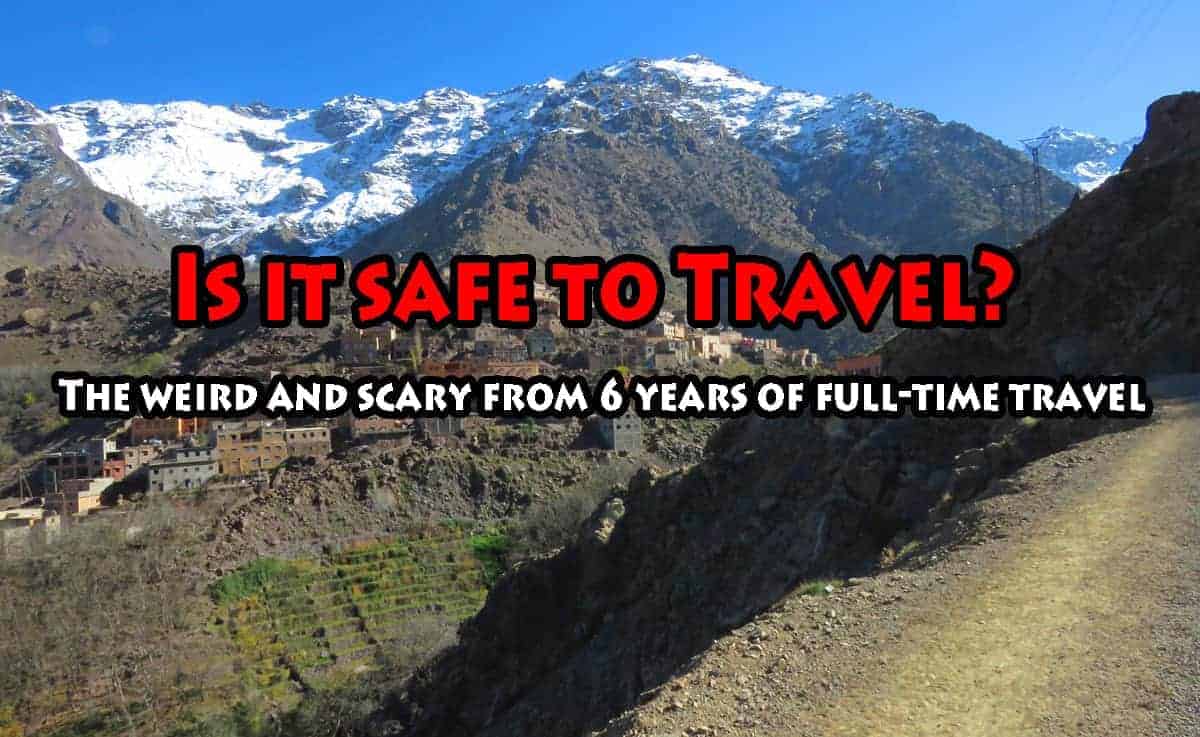Travel Insurance for Canadian Travellers
Please note: This post was written in 2015. Certain things may have changed so please doublecheck with the policies applicable in your province.
———————
I knew little about Travel Insurance a few months ago. We had always been covered through a comprehensive policy through work which covered any trips with a duration of under 60 days. In fact most people cover themselves either through work or with a short-term policy covering a 2-3 week holiday. That’s what we did in the past.
But what if you’re out of the country (or province) for over 60 days or, for that matter, over 6 months? In our case I’ve had people warn me that we will no longer qualify for provincial coverage after 6 months. Wrong. But how much does provincial coverage count anyway? I’ll explore that. I’ll also explain some basic concepts to protect you from the BS that you (might) get from private health insurance companies. Because willingly or unwillingly (because they have stupid and/or greedy people working for them), you might be quoted premiums for insurance that doesn’t fit your situation. I know that if I hadn’t gone the extra length in educating myself that we would have paid travel insurance premiums that are double what we ended up paying. I will also cover a different kind of travel insurance, that used to cover long-term travellers who are no longer covered by their provincial health insurance.
* note: when I say “Travel Insurance” I am generally referring to Medical Travel Insurance.
1) Do you have provincial Health coverage?
This will determine the kind of Travel Insurance policy you need.
Most people think is that they automatically lose provincial health coverage if they leave the province (not Canada, the province!) for 6 months plus a day. That’s not quite true. Its more complicated than that.
In the province of Quebec (our province of residence), you lose your health coverage if you are out of the province 183 days or more in a calendar year. On this trip for example, we left Canada July 8 and are due to come back to Canada May 15, 2015. That’s basically 10 ½ months in total. But, if you look at the dates, we are actually out of the country 176 days in 2014 and 135 days in 2015. No problem at all for either year. So keep the rules in mind when organizing your trip, you’ll save a lot of money (as you’ll see later) if you can maintain your provincial Health coverage. Make sure you check the rules in your province of residence because they all vary; in Ontario for example, you have to be in the province for 153 days in any 12-month period (ie. not calendar year). British Colombia, on the other hand, is one of the more lenient provinces; they allow residents to be out of the province seven months in a calendar year without loss of provincial coverage.
.
BUT THERE ARE EXEMPTIONS TO THE RULE.
Every province has a different rule of how many days you have to reside in the province in order not to lose your provincial health coverage. BUT every province also has exceptions to the rule.
In Quebec, you are entitled to a once-in-every-seven-years exception. So, if for example, we are out of the province for all of 2015, we can get an exemption for that year from the provincial authorities. Just go to see them, they’ll write up a letter authorizing you the exemption for that year. You’ll still be covered under your provincial healthcare plan. There’s other types of exemptions too, from students studying out of province to mobile workers…but I won’t get into that – this post is meant for people who just decide they want to leave the province for travel.
Every province seems to have a different rule, some much more lenient than others. Alberta allows you to leave the province for two years, come back for 6 months, then leave again for two years. In Ontario you get a two-years-in-a-lifetime exception. That’s it. British Colombia allows you an ‘extended absence’ of up to 24 months (2 years) once in a 60 month (5 year period).
.
2) I am covered under my province’s health insurance plan. Should I have a private Travel Insurance policy when travelling?
Yes. And not just when leaving the country, but even when just leaving your province of residence.
Amazingly, I didn’t know this 2nd part until just a couple of years ago. I started hearing stories in the news of people having operations or medical evacuations in other provinces and not being fully covered by their provincial health care. One guy broke his leg skiing on a mountain in the Rockies. He had to pay for the cost of the helicopter that evacuated him. Quebec didn’t cover it – in fact many expenses like medical transport (ambulance, medical helicopter), transport to bring you back home, and even some drug prescriptions are not covered by other provinces (Quebec is the worst actually when it comes to reimbursing out-of-province medical expenses). A lot of people don’t realize they should get Travel Insurance even when just leaving their own province.
You are not required to have Travel Insurance when leaving your province and some people won’t be able to get private Travel Insurance coverage anyway (like those over 65, or those with certain pre-existing conditions). But you should get it. Provincial authorities actually recommend that you do get private travel insurance when going out of province. I’ll cover the different kinds of policies available below.
3) I’m covered under my province’s health insurance plan. What kind of private travel insurance policy should I get?
I’ve mentioned above that provincial health coverage will not cover you for many expenses while out of province. And it won’t cover you for anything outside of Canada. So why is it important that I have provincial health coverage? Because most private travel insurance policies won’t cover you if you don’t have provincial health coverage. A private travel insurance company will cover you for medical expenses while out-of-province and will bring you back home as soon as you are well enough (where you will be covered by your provincial health care). They don’t want you on their dime for an extended period of time. That’s why travellers who are no longer covered under their province’s health insurance plan have to look for a different, more expensive, kind of private travel insurance policy (called Expat Insurance or International Health Insurance – to be covered further below).
There are so many different kinds of travel Insurance Policies that I barely cover the surface here. But in general you can get coverage for: 1) Accident / Medical Emergency, 2) Trip Cancellation, 3) Baggage Loss/Theft. You can tailor your policy to suit your needs. In our case we just wanted to be covered in case of medical emergencies; things that can ruin you financially. But we once, a few years ago, took a trip cancellation policy out and it really paid off when our flight to Costa Rica was cancelled and we had to spend a night in transit in Houston. The policy paid all expenses incurred including hotel and meals (including the steaks and beer we ordered with room service). Of course the more things you want to cover with your policy the higher the premium.
Make sure to study the fine print. Does it include ambulance, repatriation, dental? Does it cover family members travelling with you? What if I die – does it cover cremation, return of my body? Are there any limitations/deductions?
4) How much should it cost me to get a private travel insurance policy ? (with coverage under your provinces’ health insurance plan).
Just a bit of background on this so that you know how Insurance companies can/try to screw you over: We were covered the first 60 days of this 10 ½ month trip by the insurance policy that Lissette had at work. So we were looking for a policy that picked up where the other expired (ie. we left Canada in July. We were looking for a policy that would cover us from early September to May of 2015). Before leaving Canada I called RBC Insurance (Canada’s largest financial institution). It had been recommended to me by my financial advisor. They quoted me $1070 per person for approximately 250 days of coverage. It seemed excessively high. I decided to take my time, do more research, and only get the coverage in September when our work policy would expire (when we would already be overseas). It was both a good and bad decision.
Firstly, what RBC was quoting me was Expat Insurance. I found this out later when getting quotes from other insurance companies. The thing is that most agents you’ll be calling may not be familiar with people who want to travel for long periods of time. Quoting me Expat Insurance instead of regular Travel Insurance was either a mistake or someone looking for an opportunity to make a nice commission. So it was a good decision to do some more research and call other companies.
The bad decision was to book regular Travel Insurance after you’ve left the country. Some companies won’t even give you a quote if you are already outside Canada. We ended up getting a policy with TIC Insurance which covered us for the 250 days remaining on this trip. The cost? $535/per person (ie. $2.14/per day). Better than what we were quoted by RBC and another company for what we now know was Expat Insurance.
But it could have been cheaper. If we had booked our Travel insurance while still in Canada, the cost would have been $1.33/day, or a total of $332 for almost 9 months of coverage. The agent actually told me that I should make a stop in Canada, just to book the policy, before continuing on with our travels. That didn’t make any sense. Actually the whole rule doesn’t make any sense to me. But that’s insurance.
So, knowing what I know now:
A) Book your Travel Insurance in Canada before you leave for your travels. As mentioned, many companies will not even give you a quote if you have already left the country.
B) Use an insurance broker (they’re free) as many insurance companies only work through brokers. I used Travel Cuts (known as Voyages Campus in Quebec). They were recommended by another blogging couple I know. Although I booked my policy with TIC Insurances I was told that RBC has their Bon Voyage policy which is supposed to be good (but because we were out of the country it was not available to us). Another popular insurance coverer is World Nomads (but they don’t cover Residents of Quebec).
C) These policies require you to be covered by your Provincial Health Plan.
5) I’m not covered by any provincial health insurance plans. How do I get private coverage?
So you’ve exceeded the number of days allowed outside the province and have used up all exemptions to the residency rules for provincial health care. In this case you need Expat Insurance, also known as International Health Insurance or Worldwide Travel Insurance. I communicated with a lot of Canadian long-term travellers when doing the research for this post – but only one actually uses Expat Insurance. Nora from The Professional Hobo gave me some great information and tips;
– you can book Expat Insurance from anywhere, it doesn’t have to be from home.
– Policies are with US / Without US coverage (“without” much less expensive).
– expect to pay about $1300/yr without US coverage. You can keep premiums low by having a higher deductable. Nora has a $500 deductable. The idea is to be covered for the ‘big stuff’ while keeping premiums low.
– premiums go up with age and most companies won’t cover you past the age of 65.
– Nora uses and recommends Ingle International as Insurance Brokers (free) for Expat Insurance.
As mentioned above, RBC Insurance also provides Expat Insurance. Again though, I would suggest using an insurance broker to figure out which policy is best suited to your needs.
For more: Nora’s detailed post on the ins/outs of Expat Insurance.
Update April 2019: We use Allianz for our Expat Insurance. We recently became 50 and premiums went up – both of us now pay $1,764 per year (each) without coverage in the US and Mexico. To date we’ve never had a claim so I can’t tell you how efficient they are when you have an issue.
6) Generalities in dealing with Insurance companies.
Book with a reputable company, always check the fine print, make sure you are honest about pre-existing conditions, contact the Insurance company before going to any medical facility or undergoing any medical procedures (providing you can), keep all receipts, keep details of all communications. Always keep the Policy number and telephone number of your provider with you.
The above gives you a general idea of the rules governing Provincial health care and the different private travel insurance policies available to travellers based on their status. It is by no means comprehensive and you should always check with your provincial health provider for the latest updates. Rules change quickly. I’d really be interested in hearing the experiences of other Canadian travellers, both for myself and readers of this blog. All feedback, recommendations and tips are very much appreciated!
Related: Is it safe to Travel? The weird and scary from 6 years of full-time travel
Related: The absolute worst thing about being a full time traveller (it’s got nothing to do with travel)
Ps. If you find our blog helpful, please consider using our links to book your flights, hotels, tours, and car rentals. Have a look at our Travel Resources page.





I would just like to say that most provinces have health cards with 5 year expiry dates. if you get private insurance from abroad AND never use your provincial insurance anywhere abroad they have no way to know you aren’t there for 5 years (plus some grace period for renewal). So you could just return once every 5-6 years to renew the card without discontinuing your insurance and use a non-Canadian health insurance when abroad. I know its technically not right but there is really no way for them to know until they start tracking your entry and exit to the country and sharing the info with the health authority. Might happen, after all Canada is a Police State as bad as Russia these days, but in a different way.
I know some people who maintain their provincial health insurance abroad and get away with it (for now). You would have thought that different government departments would be co-ordinated to catch that but they’re not. Actually I have a beef about that – if you’re paying your Canadian taxes, why are you taking away my health insurance?
Also a Quebec resident here who is a long term traveler! The RAMQ website says “Please note that every time you spend 183 days or more outside the province in a given year, you lose your eligibility for that year.”
That wording has always given me the impression that I can lose coverage for a particular year, but I would regain it beginning January 1 (up until my RAMQ card expires). I’m curious if you know if you lose your coverage for good once you’ve been out of Quebec 183+ days or if you only lose coverage for that particular year?
Thanks!
Hi Gen,
Good question, I didn’t know how they applied it but I did some reading. This was some scary reading.
My understanding is that if you spend more than 183 days you lose your coverage AND it will be retroactive to when you passed those 183 days. Getting it back requires that you re-apply for a new card. Once you’ve re-applied (and been accepted) only then are you covered again.
Hope that helps 🙂
Interesting post, Frank. I’ve come here via Anita Oliver’s post that you and she co-wrote. Well done! Do you know if things have changed sine you wrote this post? I notice you mention Manitoba (which is where I live) in Anita’s post, but don’t see reference to it here.
Hi Doreen,
I know Manitoba allows you to leave the province for up to 7 months but don’t know more than that: https://www.gov.mb.ca/health/mhsip/leavingmanitoba.html. Seems hard finding info on the Manitoba government site!